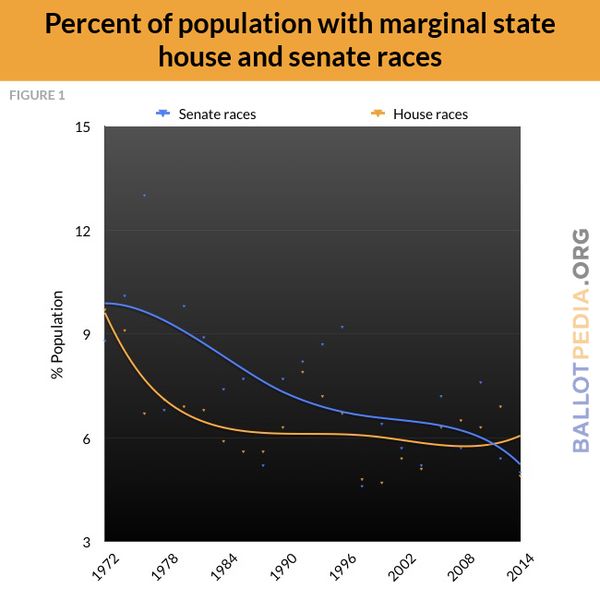Why Vote? Most Elections Are Already Decided for You

What the pundits and election watchers in traditional media didn't tell you about the 2014 general election was that it was the least competitive election season in 30 years. That's according to a new analysis authored by Professor Carl Klarner and published on Ballotpedia, which examines the number of competitive state legislative elections since 1972. An election that is won by 5 percentage points or less is considered competitive by their analysis.
According to Klarner's analysis:
Declines in electoral competitiveness have been driven by the increased partisanship and polarization of the American electorate, and have been documented by numerous political scientists. As the electorate has polarized, people who agree with each other politically and share the same party have become more likely to live in the same geographic area—whether state legislative districts, congressional districts or entire states.
While many regarded the 'wave' of voters who turned out in November as a mandate for new direction on public policy, it turns out that many races had already been decided in uncompetitive primary elections months earlier.
More from Klarner's analysis: "The 2014 state legislative primaries were not very competitive either, continuing an existing trend. Only 5.2 percent of people lived in a district where at least one of its party’s state legislative primaries was won by 5 percent or less, which is roughly similar to the level of competitiveness in general elections."
Sixty-one percent of voters lived in districts where the primary election for their state representative was not contested.
The graph illustrates a steady decline in competitive state legislative elections since 1972. Primary election competitiveness showed a similar decline.
Another aspect that was considered in the study was incumbency rate. Incumbent politicians are usually at an advantage when defending their post in an election year and are often pretty adept at thwarting re-election threats before they happen.
Some have speculated that the decline in competition could be more a result of increased incumbency. Yet findings show that the incumbency rate has only increased slightly over the last few decades -- not enough to explain the more dramatic drop in competitive elections.
Klarner explains:
Surprisingly, the improvement in the fortunes of incumbents is not because incumbents have more advantages over challengers than before. It is because incumbents are more likely to come from districts that are safe for their party than in the past.
As more elections become foregone conclusions, voters are given little incentive to show up. Consequently, the trend is expected to continue well past 2016.
Read the full analysis on Ballotpedia.
Image: Denise Cross Photography




